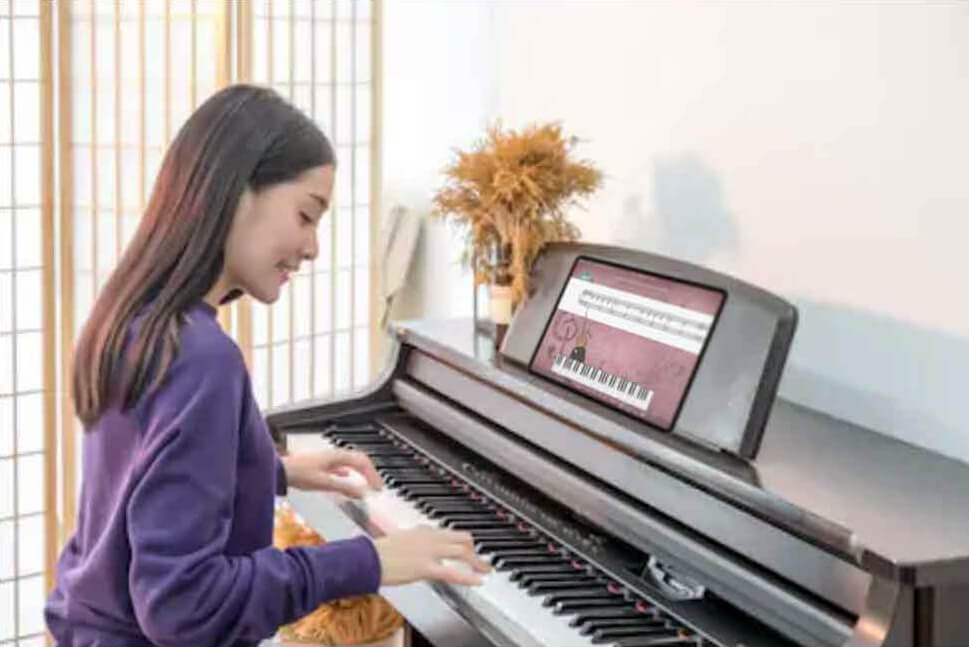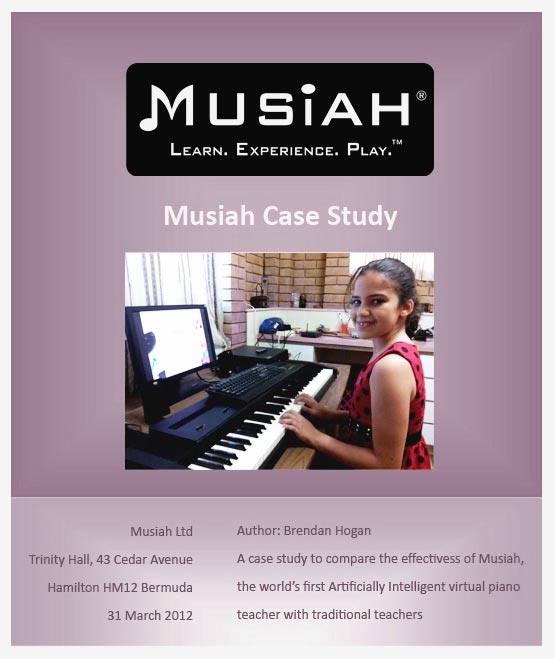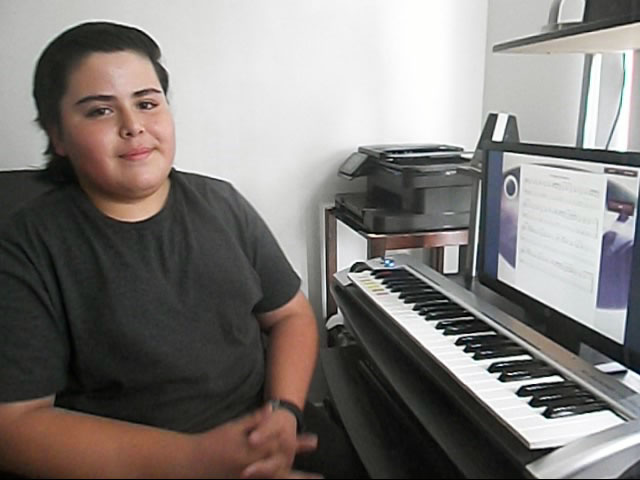
I’ll discuss both below…
Learning piano with Musiah is a fun way to learn piano really fast – up to 16 times faster than traditional piano lessons. Below you’ll discover why Musiah is the quickest and easiest way to learn piano properly, gaining real piano playing skills and music theory knowledge.
When students learn the Musiah piano syllabus with a live piano teacher, it normally takes 6 years to complete.
The biggest limitation with live piano lessons is that traditional piano teachers can only be with their students once a week — during lessons.
The rest of the time (outside of lesson time) students are left to their own devices without any support from one week to the next, often without knowing if they are practicing their songs correctly.
This results in a lot of wasted time as students often form bad habits that need to be corrected in subsequent lessons when they could otherwise be progressing on to learning new songs.
And this has been going on for hundreds of years.
I decided to create a scenario in which students of all ages are empowered to learn and progress at their optimal rate – a rate that allows them to reach their full potential.
And so I began work on creating Musiah, the world’s first Artificially Intelligent (AI) Virtual Piano Teacher.
Four years and most of my life savings later, a rough “Alpha” version of Musiah was ready to test.
 In October to December 2011, a 10-week case study was conducted to compare the effectiveness of learning piano with a very rough “Alpha” version of Musiah to learning piano with a live teacher.
In October to December 2011, a 10-week case study was conducted to compare the effectiveness of learning piano with a very rough “Alpha” version of Musiah to learning piano with a live teacher.
Even though the Alpha version of Musiah was full of bugs and lacked many of the features of today’s version, the results were impressive.
In summary, the study showed that beginner students who had access to Musiah (whether a traditional teacher was involved or not) progressed on average 5-8 times faster (during the 10 weeks of the study) than students who did not have access to Musiah.
What the case study showed was that main factor in a student’s progress is not the presence or absence of a traditional piano teacher but rather the presence or absence of Musiah.
If a student has access to Musiah (whether or not they are also learning piano from a traditional teacher), they will progress faster than a typical student learning piano with a traditional teacher alone.
 While the results of the case study were impressive, what we couldn’t know for sure at the time was how students learning piano with Musiah would fare over a longer period of time compared to students learning piano with traditional teachers.
While the results of the case study were impressive, what we couldn’t know for sure at the time was how students learning piano with Musiah would fare over a longer period of time compared to students learning piano with traditional teachers.
Fast forward to August 2013, and meet Michael Ortiz, age 13, from Fullerton CA, United States (pictured above).
In August 2013, Michael became the first person to complete the Musiah piano syllabus online and he did so in just 18 weeks.
That’s 6 YEARS OF LEARNING in just 18 weeks!
So, what was different about Michael’s approach compared to students in the case study that enabled him to progress even faster?
It’s no great mystery. The answer is really quite simple.
In Michaels’ own words:
“I practice 7 days a week at least 30 minutes per day, I don't really keep track of time, I just do it daily, and when I was using Musiah, I would go thru the lesson, and go to the practice area for like 20 minutes. As I advanced I found myself practicing more, sometimes for 2 hours. Also I tend to play at different times so I play like 10 -15 minutes per session at different times.”
So in summary, Michael practiced an average of 60-70 mins each day, 7 days a week for 18 weeks.
By contrast, the case study participants practiced an average of 15-30 mins, 3-5 days week for 10 weeks.
Yes and no. Let’s look a little deeper into practice habits gain a wider perspective...
In a traditional piano learning scenario, most beginner students practice somewhere around 15-30 mins a day, 3-5 days a week (similar to the case study participants).
Then very gradually, over a number of years, their practice levels increase as they become more advanced.
By the time a traditional student has been learning piano for 5 years (equivalent to Level 11-12 in Musiah), they’ll usually be practicing at 60-90 mins a day, 5-6 days a week (i.e. comparable levels to Michael).
In other words, when Michael was on Level 12, he had only been learning for about 12-15 weeks, yet the amount of practice he was doing was comparable to traditional piano student who has been learning for 5 years.
So the difference between Michael and most beginners (including the case study participants) is that Michael allowed his practice levels to naturally increase quite rapidly so they would be appropriate for the level of advancement of the songs he was learning.
An average student learning piano the traditional way with a live teacher and whose practice levels follow the usual trajectory, starting off low (15-30 mins a day) and increasing gradually over a number of years to 60-90 mins a day will take 6 years to complete the Musiah syllabus.
As per the case study, a student learning piano online with Musiah whose practice follows a similar trajectory to an average traditional piano student will progress 5-8 times faster than a traditional student, especially in the early stages.
The key to learning 16 times faster than an average traditional piano student as Michael (and many other students since Michael) have done is twofold:
A. You need access to Musiah, so you will have the support of an intelligent virtual piano teacher every second, every step of the way, which will dramatically increase the effectiveness of your practice.
And…
B. Aim to allow your practice levels to increase in line with your rapid progress through the course.
In other words, as a Musiah student, you may reasonably expect to become ‘advanced’ extremely quickly if you adopt the practice habits that would normally be associated with an ‘advanced’ student.
Ultimately, whatever amount of practice best suits you, Musiah is the quickest, easiest and most fun way to learn piano that will reward you with a rate of progress that is many times faster than learning the piano the traditional way.
If you (dear reader) have not yet tried learning piano with Musiah for yourself, why not take our 14 Day Free Trial.
OK, so we know that having access to Musiah and increasing your practice time as you progress to match the level of advancement of the songs you are learning are both important… but so too is HOW you practice.
A long time ago, my piano teacher, Professor Anthony Glavin at the Royal Irish Academy of Music (where I learned piano as a young lad) told me something profoundly simple that has helped me greatly over the years not only in my piano practice but in other areas of my life as well.
He said: “The slower you practice, the quicker you learn”.
Think about that for a moment. What a great lesson that is. Now more than ever, in this fast-paced life where everything has to be done as quickly as possible, these wise words have more relevance than ever.
These days everyone wants everything done instantly. Not only do we expect others to do things instantly, we also expect that we ourselves should be able to do things straight away. And this not only puts unrealistic pressure on ourselves, it leads to lower quality outcomes and lower levels of success in all aspects of our lives – not just our piano practice.
I myself have always been impatient by nature, and I have always had to make a conscious effort to slow down.
As the old joke goes… “God grant me patience — but I want it NOW!”
One of the great lessons I have learned through the process of creating Musiah — a 4 year process (i.e. about 3 years longer than I would perhaps unrealistically have liked) — is that some things just take time.
Perhaps not only was Rome not built in a day, perhaps it was also built with love and care — and in the now, just like Musiah.
Not everything is about the finish-line. It’s also about the journey, about the step we’re taking right now.
While I do reflect on this quite a lot, one of the things that inspired me to write about it today was an email I recently received from a mother who is learning play piano through Musiah along with her two sons.
She wrote:
"The lesson I am doing now is "4 x 4", level 1. It is so fast and quite difficult to do. Usually, I do one lesson in one or two days at most. But this one I've tried for the whole week, still can't make it. Can you give me a tip on how to do it?"
By default, in each Musiah piano lesson, the modules throughout the lesson are done at a slow tempo (though this is adjustable). Then, at the end of each lesson, one has to audition the piece for Musiah by playing it with a backing track and getting a score of at least 80%. During the audition, you can only choose either the medium or the full tempo.
When I looked at her progress, I saw that she had completed the lesson (up to the audition) at the slow tempo – so she could play the whole piece in time with a click track at the slow tempo.
So, it was interesting to me that on each occasion she attempted the audition, she did it on the full tempo (even though she was struggling to pass). At no stage had she ever tried the audition at the medium tempo (which is 25% slower).
As I’m sure you can guess, my suggestion was:
"Try the audition a few times at the medium tempo and see if you can pass the audition at that tempo. Then when you are ready, you can try it at the full tempo to get some extra stars.
Another approach is to go into the practice area and try playing it with the click track at different tempos, i.e. gradually increase from slow to medium, then from medium to full tempo and then re-try the audition."
It seems obvious — I know, especially when we’re looking at someone else, but so many of us (myself included) do tend to try to do everything as quickly as possible. And sometimes this leads to shortcuts that – surprise, surprise – are counter-productive.
Remember it takes 10,000 hours to master a skill, and there are no short-cuts to quality.
We must put every foundation stone in place with love and care. And if you find yourself trying to race ahead, just remember…
“The slower you practice, the quicker you learn”.
No matter what practice techniques you use, this most fundamental approach that underscores every practice technique is the key to success and ultimately to learning piano fast – often many times faster, and enjoying the journey while you learn quickly and easily.
I hope you found the above thoughts helpful.
And of course, if you (or someone you know) would like to learn piano quickly and easily through top quality piano lessons that are chock full of this sort of wisdom, why not discover how you too can Learn Piano Fast With Our 14 Day Free Trial.
And of course, if you have any questions for me personally, please feel free to contact me directly.
Brendan Hogan L.Mus.A, A.Mus.A.
Piano Teacher & Musiah Inventor
Online Piano lessons – Do They Work?
Piano Lessons For Adults
Piano Lessons For Kids
Piano Lessons For Beginners
Advanced Piano Lessons
Free Piano Lessons (on piano technique)
The Best Piano Method
The Best Piano Learning App
Learning To Play Piano As An Adult – Why it's easier than you think!